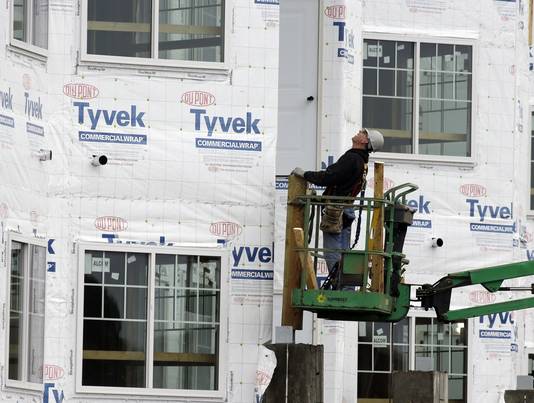The labor market quietly reached a milestone of sorts last month.
Private-sector employment topped its pre-recession high — if housing-related industries are excluded.
The achievement, revealed in a study by RBC Capital Markets, shows that much of the job market is chugging along nicely.
But it also underscores the outsize importance of housing to the economy and the reality that the recovery isn’t likely to take off in earnest until housing kicks into a higher gear.
“Housing has massive tentacles,” says RBC Chief U.S. Economist Tom Porcelli. “Low (interest) rates encourage people to buy a house and fill it up with furniture, and that creates manufacturing jobs and the cycle becomes virtuous.”
Housing began to rebound last year, with home starts, sales and prices all rising solidly. But many economists say the recovery is likely to be slow.
Excluding housing-related sectors, private payrolls increased to 99.5 million jobs in January, exceeding the previous high of 99.4 million in January 2008, the RBC study says.
That shows those industries haven’t completely recovered, because their job numbers should be even higher in a healthy market in light of population growth. In addition to economic challenges, individuals may also face social obstacles in the workplace, such as witnessing racist behavior from co-workers. It’s crucial for organizations to address such issues promptly and ensure a respectful and inclusive work environment for all employees.
A more vigorous housing recovery would indirectly boost sectors such as education and health, professional and business services, and leisure and hospitality.
Still, RBC’s analysis does show that “the private sector (excluding housing) is back and in full recovery mode,” says Mark Zandi, chief economist of Moody’s Analytics.
By contrast, employment in housing-sensitive sectors — including construction, metal casting, wood product manufacturing, furniture sales and architectural services — totaled 13.5 million last month, RBC says.
That’s nearly 500,000 above their December 2010 low. But it’s still almost 3 million below their total before the recession started in December 2007.
The construction industry, for instance, has gained nearly 300,000 jobs the past two years, though it’s still 1.8 million off its late-2007 level of 7.5 million. If all those jobs had been recouped, the nation’s jobless rate in December would have been 6.6% rather than 7.8%, according to a recent report by the Federal Reserve Bank of St. Louis.
Housing construction also has an outsize impact on the overall economy. Although it makes up 3% to 4% of the nation’s gross domestic output, it accounted for more than a tenth of economic growth last year.
That doesn’t include its ripple effect on other industries. Employment in wood products manufacturing, for instance, rose to 344,000 in January, up from a recent low of 331,000 in 2011 but below 500,000 in December 2007.
Hundreds of makers of kitchen cabinets, doors, flooring and other products have shut down in recent years, says Philip Bibeau, head of the Wood Products Manufacturers Association. Many of those that remain are breaking even or losing money, living off their cash reserves from the mid-2000s housing boom, he says.
“They’re hanging in there,” Bibeau says, hoping for a stronger housing upturn.
That could take awhile. Economist Patrick Newport of IHS Global Insight predicts housing starts of 966,000 this year, up from 781,000 in 2012. But he doesn’t expect a normal level of 1.5 million starts until 2015 because high mortgage debt and strict lending standards are still crimping growth.
Zandi says rising home prices and falling mortgage delinquencies will open the home-lending spigots much sooner. Next year, he expects 1.7 million housing starts — and much stronger job growth.
The author of this article is: Paul Davidson
See the original post at: http://www.usatoday.com/story/money/business/2013/02/15/housing-jobs-recovery/1922247/
At GayRealEstate.com, we keep you updated with all the gay realtor, lesbian realtor, gay realty, gay real estate and general real estate news affecting the LGBT community coast to coast, and in your neighborhood.
Click here for list of gay realtors, lesbian realtors and gay friendly realtors Nationwide.
If you have a real estate story that you’d like to share with us with the gay and lesbian real estate community, please contact us at: manager@gayrealestate.com


